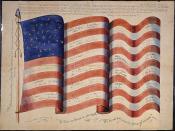Coontz and Crittenden both, in their own essays, agree that the 1950's were a time of optimism about marriage, although, they disagree with each other on the motivation and outcome of that optimism. The 1950's are looked back upon as the "Golden" family years. Everyone wishes that they had their families in the 1950's, things were simpler, there were less temptations for their kids, but the reality is, the 1950's are like any other decade, with its own problems. The difference about the 1950's is the problems were swept under the carpet. Problems were not dealt with, they were pushed back and left to simmer on the back burner, hoping that they would just go away.
Crittenden's opinion is that families were based on the "mutual sacrifices husbands and wives make for each other, which understood marriage as an arrangement of give-and-take rather than quid pro quo." (Crittenden, p72) Which, more or less says, that, now, we look for what we can get in a marriage rather then what we can do to make the marriage better.
I think a good example of this is the TV show bachelorette. Where men, go on the show and try to win the women over so that, in the end, they could take a million dollars or the women for their wife. On the flipside of that, the lady plays to win two million dollars if the one she chooses picks her instead of the money. Her view, is that marriage is failing because society's opinion that "marriage is a good and laudable, that separation is a calamity and a failure, and by the opinion of the husband and wife themselves that only the gravest incompatibility can justify divorce." (Crittenden, p70)
Crittenden writes that as a society "we must also understand that family...


